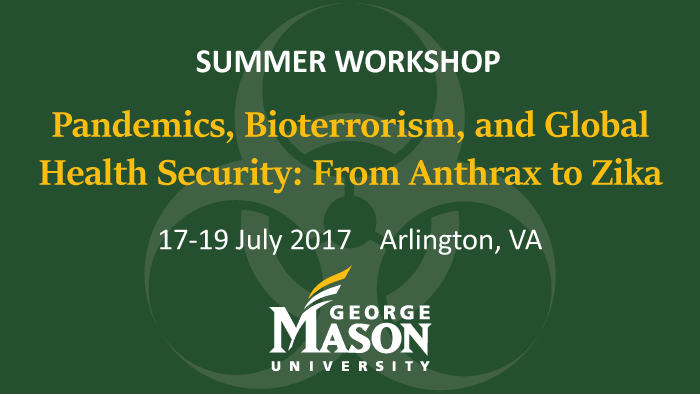
- This event has passed.
Summer Workshop on Pandemics, Bioterrorism, and Global Health Security
July 17, 2017 - July 19, 2017

Threats to global health security continue to evolve due to the changing nature of conflict, advances in science and technology, globalization, and the growing threat posed by emerging infectious diseases and pandemics. Pandemics, Bioterrorism and Global Health Security: From Anthrax to Zika is a three-day, non-credit summer workshop designed to introduce participants to the challenges facing the world at the intersection of national security, public health, and the life sciences. The workshop faculty are internationally recognized experts from the government, private sector, and academia who have been extensively involved with research and policy-making on public health, biodefense, and national security issues. The workshop is held on the campus of the Schar School of Policy and Government in Arlington, Virginia on July 17-19, 2017.
Private and public organizations face a number of challenges in adapting to the changing global biosecurity landscape. The spectrum of biological threats is diverse, including naturally occurring disease outbreaks such as SARS, Zika, and Ebola, lapses in biosafety, dual-use research of concern, and the threat of bioterrorism. A severe disease outbreak, whether natural or man-made, can affect not just public health, but also public safety and national security. Pandemics and bioterrorist attacks will confront government agencies and the private sector with the need to make high-impact decisions with limited information during a rapidly evolving situation. Further complicating this domain is the dual-use nature of biology: the knowledge, skills, and technology developed for legitimate scientific and commercial purposes can be misused by those with hostile intent. Research with dangerous pathogens and the development of advanced biotechnologies such as synthetic biology and genome editing poses a dilemma for policy-makers and researchers who seek to maximize the benefits of such research while minimizing the risks. Thus, public health, law enforcement and national security agencies, the pharmaceutical and biotech industries, and the academic life sciences community need to develop new types of expertise, adopt new types of risk assessment and risk management strategies, and learn to collaborate with each other.
Implementing these new priorities will require substantial organizational learning and change. But large organizations have deeply embedded professional norms and organizational culture that make them resistant to change, even during times of crisis. Each organization responds with its own routines, and its own distinctive view of “the threat,” which dilutes new initiatives, encourages stovepiping, and impedes effective collaboration. These organizational tendencies grow even more pronounced during times of declining budgets. Thus, while the need for collaboration is great, the potential for differing organizational styles to produce conflict is high.
The 1976 swine flu scare, 2001 anthrax letter attacks, SARS and avian influenza outbreaks, 2009 H1N1 influenza pandemic, 2014-2016 Ebola outbreak in West Africa, and 2015-2017 Zika outbreak provide rich case studies of how government agencies and international organizations have struggled to address novel biological threats, make high-impact decisions with limited information, and work effectively with new partners. The lessons from these cases are broadly applicable to both public and private organizations seeking to address current and emerging biosecurity risks.
Features
- Syllabus and reading materials
- Social hour after first day of course
- Light breakfast, coffee, and lunch provided on all days
- Certificate of Attendance
Courses Objectives
- Identify the range of biological threats and assess the risks they pose to public health and national security
- Describe impediments to organizational change and identify strategies for overcoming these obstacles.
- Examine lessons learned from the SARS and avian flu outbreaks, the 2009 influenza pandemic, and the 2014-2016 West Africa Ebola outbreak.
- Explore the dual-use dilemma and how to balance the benefits of advanced biotechnologies against the safety and security risks they can pose.
- Investigate the growing importance of biotechnology to the national economy, domestic and international risks to biotechnology innovation, and legal, policy, and regulatory measures for safeguarding the bioeconomy.
- Understand the technical, political, regulatory, and financial obstacles to developing new medical countermeasures for bioterrorist and pandemic threats.
Who Should Attend
Professionals and academics, both domestic and international, in public health, the life sciences, the biotechnology and pharmaceutical industries, international affairs, law enforcement, emergency management, and national security who have responsibilities for preventing, preparing for, or responding to pandemics, bioterrorism, and other threats to global health security.
Past participants have come from a range of government agencies, including the Department of Health and Human Services, National Institutes of Health, Food and Drug Administration, Biomedical Advanced Research and Development Authority, Centers for Disease Control and Prevention, Federal Emergency Management Agency, Department of the Army, Defense Threat Reduction Agency, Lawrence Livermore National Laboratory, Pacific Northwest National Laboratory, and Oak Ridge National Laboratory; private and non-profit organizations such as CRDF Global, Battelle Memorial Institute, Emergent Biosolutions, Booz Allen Hamilton, BAE Systems, Engility, Noblis, and Quest Diagnostics; universities and think tanks such as Virginia Tech, Kent State University, University of South Florida, Institute for Defense Analysis, and MITRE; and foreign countries, including the Center for Biosecurity and Biopreparedness in Denmark, the Biosecurity Office of the Netherlands, the Rwanda Ministry of Agriculture, and the Philippine National Police Force.
Registration
Prior to May 1, the course fee is $1,100. After May 1, the course fee is $1,200. Discounts are available for George Mason University faculty, students, and alum and for groups of three or more from the same organization. If you qualify for one of these discounts, please email biodefensegmu@gmail.com to receive a promo code.
Logistics
The summer workshop will be held on July 17-19, 2017 on the Arlington campus of the Schar School of Policy and Government. The Schar School is located in Founder’s Hall at 3351 Fairfax Drive in Arlington, VA. The school is conveniently located two blocks from the Virginia Square-GMU Metro station on the Orange Line. Garage parking is also available.


